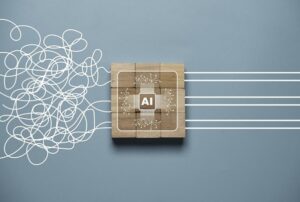
Strategic decision-making in businesses revolves around the collection and analysis of data. In a day and age when data is considered the new currency, even the smallest businesses gather massive amounts of information to help them understand their customers better, analyze business performance, assess market conditions, spot future trends and ultimately make smarter business decisions.
However, data is only valuable if it’s accurately managed, processed and interpreted. Back in the day, transforming datasets into actionable insights was the preserve of data analysts and scientists. Nowadays, putting humans in charge of extracting meaning from raw data would be a Sisyphean endeavor. Manual analysis can no longer keep up with the data boom of the past few years. The more data businesses gather the more cumbersome the process becomes.
That’s where artificial intelligence (AI) comes into play. An increasing number of businesses are now resorting to artificial intelligence consulting firms to make sense of the data they obtain through various channels, but how effective are these solutions and how exactly can they improve the decision-making process? The AI buzz we’ve witnessed recently has mostly been centered around the emergence of advanced Generative AI and Large Language Models like ChatGPT that are able to understand and create human-like text with uncanny accuracy. However, AI’s capabilities go far beyond answering complex questions and writing essays.
The market size for AI is expected to reach US$305.90bn in 2024 and the ubiquity of AI-based programs is hard to ignore. No longer a concept associated with utopian or dystopian scenarios, AI has become a reality that has left no industry or sector untouched. So, let’s see how this innovative technology can assist entrepreneurs and business leaders in making informed and highly accurate business decisions.
Predicting the future with AI
The power of AI stems from its amazing ability to predict the future. There’s no crystal ball involved but something much more powerful and precise called predictive analytics. Business owners once relied on the experience they had accumulated over the years and their instinct to foresee potential outcomes and make important decisions accordingly. However, using past performance as a predictor for future behavior was far from being a full-proof method.
Now businesses can leverage AI’s predictive analytics capabilities to gain a deeper understanding of market dynamics and forecast trends, leading to better and faster decision-making. AI models employ complex algorithms and machine learning to analyze vast amounts of data from the past and present and identify patterns, tracking the health of different brands and anticipating future events.
With the business landscape becoming increasingly competitive and constantly transforming under the influence of a wide variety of factors like tech advancements, economic fluctuations and evolving consumer preferences, it’s getting harder for businesses to stay up to date with and thrive amidst these changes. Fortunately, predictive analytics allows businesses and organizations to unlock a lot of valuable insights from spotting operational inefficiencies and anticipating risks to uncovering patterns in customer behavior, forecasting demand, identifying marketing opportunities and more.
AI-powered predictive analytics enable leaders and managers to develop a forward-thinking mindset and make more proactive decisions, thus gaining a competitive edge in their respective markets. That’s how AI has come to revolutionizing the field of market research which serves as the backbone of informed decision-making.
Putting predictions into practice
Businesses in all industries and sectors can take advantage of predictive analytics to make data-backed decisions and achieve their goals. In the healthcare field, predictive analytics can help health professionals diagnose health issues accurately and quickly and determine a proper treatment plan.
In finance and banking, these models can be used to evaluate customers’ creditworthiness, identify fraudulent activity and make informed investment decisions. The retail sector can also benefit greatly from using AI solutions to forecast inventory needs, predict potential customer behavior and improve the shopping experience.
Predictive analytics is a versatile and adaptable tool that can respond to businesses’ specific needs and objectives, so its practical applications vary depending on the context in which it is used. So, let’s take a look at some real-world instances of how companies use AI to streamline decision-making.
British consumer goods group Unilever comes up as a notable example in this respect. The multinational corporation was aiming to tackle the issue of deforestation in its supply chain. This meant ensuring that their palm oil, a heavily used ingredient in the manufacturing of consumer goods, came from deforestation-free sources. This prompted the company to employ anonymized analysis of mobile phone signals to track palm oil across its supply chain and thus identify unauthorized providers or spot unusual activity.
Some of the world’s largest ports in Rotterdam, Los Angeles and Singapore have also started embracing AI solutions to optimize operations and decision-making. There are many moving parts that go into the management of a large seaport and lots of decisions have to be made on a daily basis, from scheduling transport and handling equipment to ensuring cargo loading and discharging, all with a very low tolerance for errors.
The complex nature of the maritime industry and the seaport system has brought AI and advanced analytics to the forefront. The Port of Rotterdam is currently using PortXchange Synchronizer, an AI-powered platform that gathers data from various sources and gives decision-makers access to real-time forecasts and accurate industry information. This enables stakeholders like shipping companies, terminals and port authorities to monitor activity and plan operations in a more timely and effective manner.
Final thoughts
With its ability to process and analyze vast amounts of data faster and with higher accuracy than humans, AI has become a game-changer in market research, transforming the decision-making process for many organizations and enterprises. By leveraging AI’s power, companies are able to respond and adapt to the constant changes in the marketplace and turn challenges into opportunities. Given its increasing ubiquity, AI is clearly paving a data-driven future for businesses.




